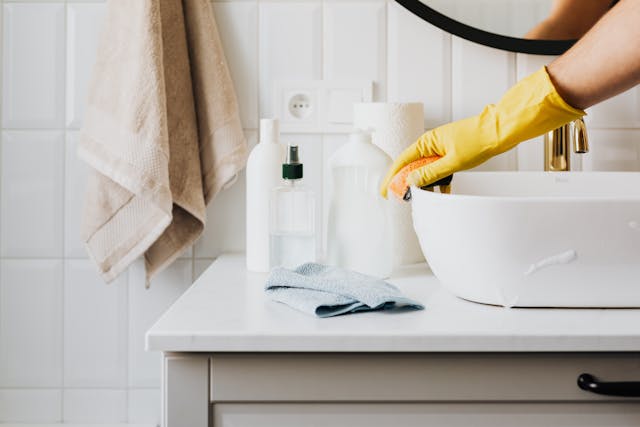Maintaining a clean and healthy home is more than just a matter of aesthetics and appeal. A clean environment contributes significantly to our well-being as well, both physically and mentally. Dust, clutter, and germs can all negatively impact your health, leading to allergies, respiratory issues, and even increased stress levels. In contrast, a clean home promotes a sense of calm, reduces the risk of illnesses, and creates a comfortable space where you and your family can thrive.
Whether you’re a busy professional, a parent, or someone looking to improve their living space, there are several practical ways that will help you maintain a home that supports your health and happiness. This blog will guide you through some essential tips for keeping your home cleaner and healthier. So, let’s begin:
1. Improve Indoor Air Quality
Indoor air quality is an overlooked aspect of a healthy home, and poor air quality can lead to respiratory issues, headaches, and fatigue. Improving the air quality in your home can help prevent these problems and create a more comfortable living space. A straightforward way to enhance indoor air quality is by ensuring adequate ventilation. Whenever the weather allows, open windows and doors to let in fresh air, and utilize exhaust fans in spaces like the kitchen and bathroom to help eliminate stale air and odors.
Additionally, regular duct cleaning is also essential for maintaining good air quality. Dust, allergens, and other contaminants can accumulate in your home’s air ducts, which are then circulated throughout your living spaces. Having your ducts cleaned regularly by a professional company, such as RÉF AIR, can reduce the number of contaminants in your home and improve overall air quality. By focusing on ventilation and keeping your ducts clean, you can create a healthier environment for you and your family.
2. Establish a Cleaning Routine
One of the most effective ways to keep your home clean is by establishing a regular cleaning routine. Cleaning doesn’t have to be a time-consuming task if it’s done consistently. When you clean regularly, you prevent dirt and dust from building up, making each cleaning session more manageable.
Start by creating a cleaning schedule that fits your lifestyle. Divide tasks into daily, weekly, and monthly chores. Weekly chores could involve vacuuming the carpets, cleaning the bathrooms, and washing the bed linens. Monthly tasks might include deep cleaning the oven, dusting ceiling fans, and cleaning out the refrigerator. By spreading out these tasks, you’ll avoid feeling overwhelmed and keep your home consistently clean.
3. Use Eco-Friendly Cleaning Products
The cleaning products you use can have a significant impact on both your home environment and your health. Many commercial cleaning products contain harsh chemicals that can cause skin irritation and respiratory problems and contribute to indoor air pollution. Switching to eco-friendly cleaning products is a simple way to create a healthier home.
Eco-friendly cleaning products are made from natural ingredients that are less likely to cause allergic reactions or harm the environment. They’re just as effective as traditional cleaners but without the harmful side effects. You can find eco-friendly options at most stores, or you can make your own using common household ingredients like vinegar, baking soda, and lemon juice. These natural cleaners are safe, affordable, and effective at keeping your home clean.
4. Focus on High-Touch Surfaces
High-touch surfaces, like doorknobs, light switches, and countertops, can harbor a lot of germs. Because these areas are touched frequently by multiple people, they can easily spread bacteria and viruses throughout your home. Regularly cleaning and disinfecting these surfaces is crucial for maintaining a healthy living environment.
To clean high-touch surfaces, use a disinfectant spray or wipes, and make sure to follow the instructions on the product label to ensure it’s effective. For a natural alternative, you can use a mixture of water and vinegar or a solution of water and hydrogen peroxide. Be sure to clean these surfaces at least once a day, especially during cold and flu season, to reduce the risk of spreading germs.
5. Declutter the Living Spaces
Clutter can make a home feel chaotic and overwhelming, contributing to stress and anxiety. A cluttered environment can also make it harder to keep your home clean, as dust and dirt can accumulate in areas that are difficult to reach. Decluttering your living spaces is a simple yet powerful way to create a healthier home.
Start by going through each room and identifying items that you no longer need or use. Organize your belongings in a way that makes them easy to access and store. Use storage solutions like bins, shelves, and cabinets to keep everything in its place. Decluttering your home not only makes it look better but also makes it easier and more efficient to clean.
6. Maintain a Clean Kitchen
The kitchen is one of the most important areas of your home to keep clean, as it’s where you prepare food. A dirty kitchen can lead to foodborne illnesses and attract pests, making it essential to maintain good hygiene in this space.
Start by cleaning up after every meal. Wipe down the countertops, clean the sink, and make sure all dishes are washed or loaded into the dishwasher. Don’t forget to clean under appliances like the toaster and microwave, as crumbs and spills can accumulate there. It’s also important to regularly clean out your refrigerator, throw away expired items, and wipe down the shelves. Finally, mop the kitchen floor at least once a week to remove any dirt or spills. By keeping your kitchen clean, you’ll reduce the risk of illness and make cooking more enjoyable.
7. Ensure Proper Waste Disposal
Proper waste disposal is crucial for maintaining a clean and healthy home. Trash that isn’t disposed of properly can attract pests such as roaches and mice, cause unpleasant odors, and contribute to environmental pollution. If you’re looking for reliable rubbish removal, companies like 1300 Rubbish provide efficient and hassle-free services across Australia, ensuring that your waste is managed correctly and your home stays clean.
Begin by separating your waste into recyclables, compostables, and general trash. Many communities offer recycling services, so make sure to familiarize yourself with what can and cannot be recycled in your area. Composting organic waste, such as food scraps and yard clippings, is a great way to reduce the amount of trash you produce and create nutrient-rich soil for your garden. By managing your household waste properly, you’ll keep your home cleaner and contribute to a healthier planet.
Creating a cleaner and healthier home doesn’t have to be overwhelming. By following these essential tips, you can make significant improvements to your living environment. These simple actions can lead to a cleaner, healthier, and more comfortable home for you and your family. Taking the time to implement these tips will not only make your home more pleasant to live in but also help protect your health and well-being. Start today by incorporating these practices into your routine, and enjoy the benefits of a cleaner, healthier home.






Leave a Reply